Do you remember the occasion when you first felt consciousness of your own, individual self?
“That was in my eleventh year. There, I suddenly- on my way to school, I stepped out of a mist. It was just as if I had been in a mist, walking in a mist, and I stepped out of it and I knew: I am. I am what I am. And then I found that I had been in a mist, not knowing to differentiate myself from things. I was just one thing, among many things.”
– C.G. Jung, interviewed by John Freeman, 1959
I had such an experience in summer of 2019. I know because it happened while reading my favourite book, Hermann Hesse’s Siddhartha. I even remember the specific passage. Fittingly, it is from the chapter “Awakening”.
He looked around him as if seeing the world for the first time. The world was beautiful, strange and mysterious. Here was blue, here was yellow, here was green, sky and river, woods and mountains, all beautiful, all mysterious and enchanting, and in the midst of it, he, Siddhartha, the awakened one, on the way to himself. All this, all this yellow and blue, river and wood, passed for the first time across Siddhartha's eyes. It was no longer the magic of Mara, it was no more the veil of Maya, it was no longer meaningless and the chance diversities of the appearances of the world, despised by deep-thinking Brahmins, who scorned diversity, who sought unity. River was river, and if the One and Divine in Siddhartha secretly lived in blue and river, it was just the divine art and intention that there should be yellow and blue, there sky and wood-and here Siddhartha. Meaning and reality were not hidden somewhere behind things, they were in them, in all of them.
‘How deaf and stupid I have been’, he thought, walking on quickly. ‘When anyone reads anything which he wishes to study, he does not despise the letters and punctuation marks, and call them illusion, chance and worthless shells, but he reads them, he studies and loves them, letter by letter. But I, who wished to read the book of the world and the book of my own nature, did presume to despise the letters and signs. I called the world of appearances, illusion. I called my eyes and tongue, chance. Now it is over; I have awakened. I have indeed awakened and have only been born today.’
I was honestly moved to tears. There is such beauty in the simplicity of it. I realized that what we perceive and what is there, they are different things. And that all the things there are, in the way that they are, are good. Whoever I was before that moment, I had not known these fundamental truths of life.
I was – could be, at least – in charge of my perception, my attitude towards the world, my orientation in it. From there I realized that I was not merely adrift in the ocean of life, but captain of my own ship. And then I knew that what I did could influence what happened to me, could change the world around me. Another truth.
We are the masters of our own fate.
Where was I? Where had I been going? How did I get here? Was this where I wanted to be? Where did I want to go now that I could choose? I knew I was not happy in the place that I was, and I was starting to ask the right questions.
This happened to me at 22; it happened to Jung at 11, maybe that’s a normal age – but then, he was crazy for sure! Normal people don’t give rise to their own school of thought in an entirely new discipline, after all. Does anyone study these things in our age? Spirituality today is such a taboo, it’s so boring. Nobody talks about awakening. Certainly, it doesn’t seem to happen to some at all – many have died who have never lived.
The disciples came to him and asked, ‘Why do you speak to the people in parables?’ He replied, “Because the knowledge of the secrets of the kingdom of heaven has been given to you, but not to them. Whoever has [been given it] will be given more, and they will have an abundance. Whoever does not have [it], even what they have will be taken from them. This is why I speak to them in parables: ‘Though seeing, they do not see; though hearing, they do not hear or understand.’ […]
But blessed are your eyes because they see, and your ears because they hear. For truly I tell you, many prophets and righteous people longed to see what you see but did not see it, and to hear what you hear but did not hear it.”
– Mt 13:10-17, NIV
There are those who open their eyes but briefly and, blinded by the light, scared by the responsibilities of conscious living, feeling the weight of their conscience, flee, back into mindless conformity. Then, there is simply forgetting. Funnily enough, Siddhartha does both. He goes to the city, alive and awake, then the years go by. Middle-aged, he one day finds himself a gambler, married, with a son. So shocked is he by what became of him that his first instinct is to run away and kill himself.
C.S. Lewis’ Chronicles of Narnia offer a great depiction. The children Digory and Polly, accompanied by their embittered old uncle (and aspiring wizard) Andrew witness the creation of the world Narnia by the Lion Aslan through song. Aslan, who according to Lewis is that world’s Christ-figure, gives a select few animals the ability to think and speak and welcomes them into the world with some words of advice.
“’Creatures, I give you yourselves’, said the strong, happy voice of Aslan. ‘I give you for ever this land of Narnia. I give you the woods, the fruits, the rivers. I give you the stars and I give you myself. The Dumb Beasts whom I have not chosen are yours also. Treat them gently and cherish them but do not go back to their ways lest you cease to be Talking Beasts. For out of them you were taken and into them you can return. Do not so.’”
– C.S. Lewis, The Chronicles of Narnia (HarperCollins complete ed.)
Knowledge has been given to you, but not to them.
Later, while the children happily chat with the Lion, Andrew – so frightened that he had convinced himself he must be hallucinating, and the beasts aren’t really talking – could hear only noise. He thinks only of getting out of there as fast as possible and exploiting this new world for profit.
“’Please, Aslan,’ said Polly, ‘could you say something to – to unfrighten him? And then you could say something to prevent him from ever coming back here again?’
‘Do you think he wants to?’ said Aslan.
‘Well, Aslan,’ said Polly, ‘he might send someone else. He’s so excited […] and he thinks–‘
‘He thinks great folly, child,’ said Aslan. ‘This world is bursting with life for these few days because the song with which I called it into life still hangs in the air and rumbles in the ground. It will not be so for long. But I cannot tell that to this old sinner, and I cannot comfort him either; he has made himself unable to hear my voice. If I spoke to him, he would hear only growlings and roarings. Oh, Adam’s sons, how cleverly you defend yourselves against all that might do you good! But I will give him the only gift he is still able to receive.’
He bowed his great head rather sadly, and breathed into the magician’s terrified face. ‘Sleep,’ he said. ‘Sleep and be separated for some few hours from all the torments you have devised for yourself.’ Uncle Andrew immediately rolled over with closed eyes and began breathing peacefully.”
– C.S. Lewis, The Chronicles of Narnia (see above)
How great that this is in a children’s book. We used to trust children so much more than we do today.
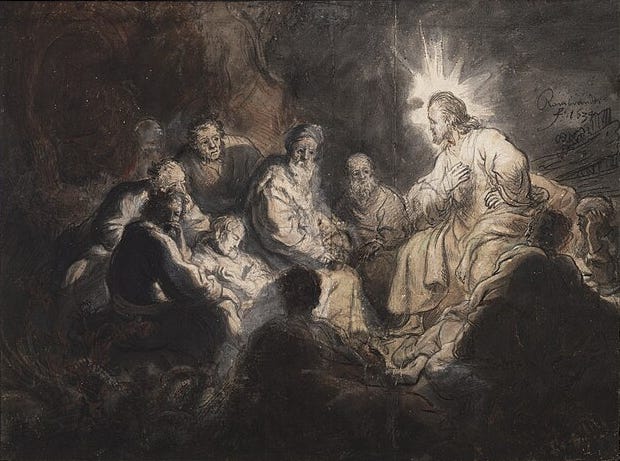
A common symbol associated with awakening is light. We call one who has walked that path to perfection “enlightened”. Artistically, we often see this depicted as a halo.
“In him was life, and that life was the light of all mankind. The light shines in the darkness, and the darkness has not overcome it.”
– Joh 1:4-5, NIV
My favourite such depiction is found in Ovid’s Metamorphoses, in the story of Phaethon, son of Apollo raised by his mother, Clymene. She is one day accused of lying – by extension, infidelity – so, Phaethon sets out to obtain proof of fatherhood from the god. When he arrives, he is blinded by the divine radiance of his father’s crown.
Here Phaeton still gaining on th' ascent, To his suspected father's palace went, 'Till pressing forward through the bright abode, He saw at distance the illustrious God: He saw at distance, or the dazzling light Had flash'd too strongly on his aking sight. The God sits high, exalted on a throne Of blazing gems, with purple garments on; The Hours, in order rang'd on either hand, And Days, and Months, and Years, and Ages stand. Here Spring appears with flow'ry chaplets bound; Here Summer in her wheaten garland crown'd; Here Autumn the rich trodden grapes besmear; And hoary Winter shivers in the reer. Phoebus beheld the youth from off his throne; That eye, which looks on all, was fix'd in one. He saw the boy's confusion in his face, Surpriz'd at all the wonders of the place; And cries aloud, "What wants my son? for know My son thou art, and I must call thee so." "Light of the world," the trembling youth replies, "Illustrious parent! since you don't despise The parent's name, some certain token give, That I may Clymene's proud boast believe, Nor longer under false reproaches grieve." The tender sire was touch'd with what he said, And flung the blaze of glories from his head, And bid the youth advance: "My son," said he, "Come to thy father's arms! for Clymene Has told thee true; a parent's name I own, And deem thee worthy to be called my son.
The Graeco-Roman gods had many names that were more, or less widely known. (This is not as strange as it might first seem, e.g. Jesus is also called “Christ”, “Messiah”, “the Son”, “Lion of Judah”, the evangelists are associated with certain animals, etc.) Sometimes they were named after places they were worshipped, deeds they had committed, two gods merged into one over time and combined names… then there’s a Greek and Latinized version of some names, and so on.
I use Apollo here for the sake of consistency. He is described as a king presiding over his court: the hours, days, months, years, ages, and the seasons. This is because while he was god of the arts, he was also associated with the passage of time in his function as the sun god, dragging it across the sky in his chariot. The one who (in the morning) opens and (in the evening) closes the gates to his stable is the goddess Aurora.
The meaning of the name “Apollon” is lost, but it seems it might have meant “Redeemer”, “Destroyer”, “Purifier”, “Herald”, or “Warden against Evil”. His other by-names are of great interest here: “Phoebos” / “Phoebus” (“the Radiant One”), “Helios” / ”Sol” (“the Sun”). There is also the story of his victory over the serpent Python, giving name to the settlement of Pytho. Pytho would eventually become Delphi, with “Apollo Pythios” as guardian deity of its temple. That temple and its oracle (the high priestess, “Pythia”) were the most important, unanimously recognized cultural institution between the different peoples of ancient Greece. Above the temple entrance was written: “Know thyself”.
Popularized by Nietzsche – but widely used by the poets, such as Hölderlin before – philosophers and psychologists distinguish between the “Apollonian” and “Dionysian” way of Being (after “Baccus” / “Dionysus”, god of feasts): Calm, rational, distanced spirituality vs. emotional, passionate one-ness of man and nature. The former was often seen as superior, but every living human being arguably embodies both at times.
An interesting note on Apollo’s headdress: Preceding those events, after the slaying of the dragon Python, is the tale of Apollo and Daphne.
Amor, god of love, was annoyed with Apollo’s boasting. For fun, he pricks him with an arrow that’ll make him fall in love and fires another at the nymph Daphne that’ll make her be totally repulsed. Apollo pursues her for a while, until she desperately begs her father, the river god Peneus, to change her appearance. He relents and – be careful what you wish for – turns her into a tree.
Apollo, however, loves her in this form as much as ever. He declares that tree his sacred tree and fashions a wreath from its branches that he will always wear in reverence:
Oh help, she cry'd, in this extreamest need! If water Gods are deities indeed: Gape Earth, and this unhappy wretch intomb; Or change my form, whence all my sorrows come. Scarce had she finish'd, when her feet she found Benumb'd with cold, and fasten'd to the ground: A filmy rind about her body grows; Her hair to leaves, her arms extend to boughs: The nymph is all into a laurel gone; The smoothness of her skin remains alone. Yet Phoebus loves her still, and casting round Her bole, his arms, some little warmth he found. The tree still panted in th' unfinish'd part: Not wholly vegetive, and heav'd her heart. He fixt his lips upon the trembling rind; It swerv'd aside, and his embrace declin'd. To whom the God, Because thou canst not be My mistress, I espouse thee for my tree: Be thou the prize of honour, and renown; The deathless poet, and the poem, crown. Thou shalt the Roman festivals adorn, And, after poets, be by victors worn. Thou shalt returning Caesar's triumph grace; When pomps shall in a long procession pass. Wreath'd on the posts before his palace wait; And be the sacred guardian of the gate. Secure from thunder, and unharm'd by Jove, Unfading as th' immortal Pow'rs above: And as the locks of Phoebus are unshorn, So shall perpetual green thy boughs adorn. The grateful tree was pleas'd with what he said; And shook the shady honours of her head.
And so the laurel wreath is a symbol of Apollo. That’s what a halo is: a “sun crown”. Roman emperors and other eminent figures – top athletes, artists, generals in triumph – often wore or were depicted wearing such laurel wreaths, diadems or other radiant crowns. Not just in antiquity, all throughout history, across cultures and religions. Even in our own day and age.
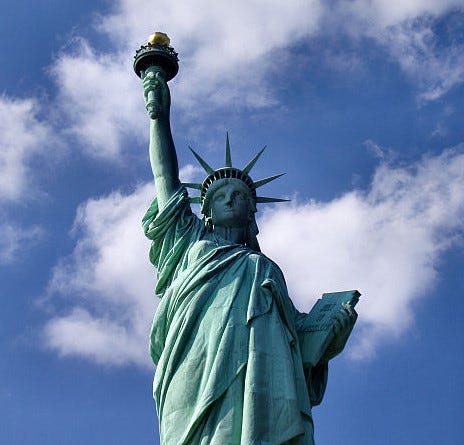
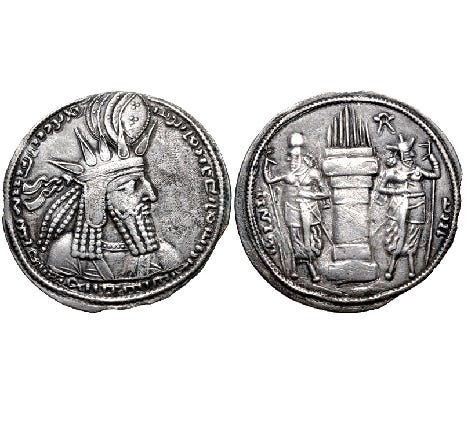

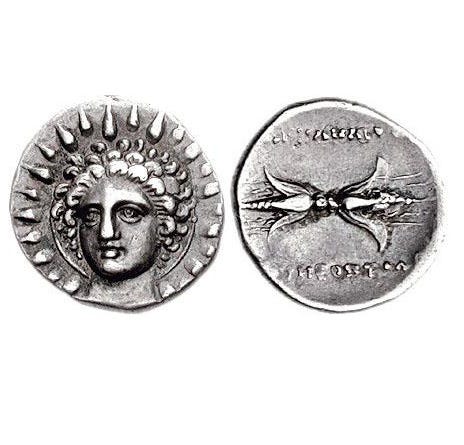
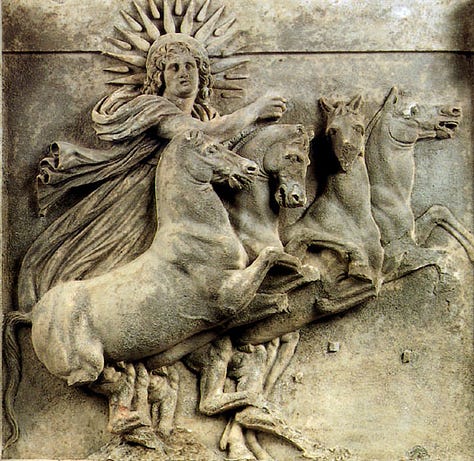
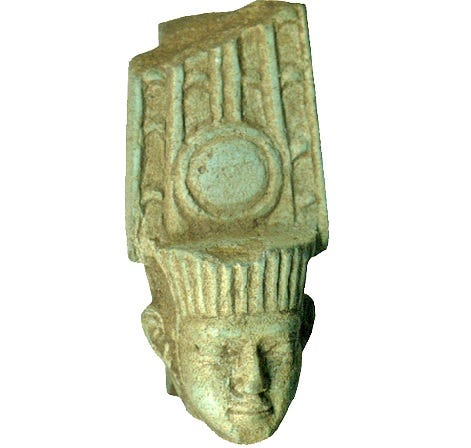

The in my opinion most symbolically satisfying kind of halo is to be found in Islamic art. Like fire, truth illuminates, but the truth also hurts. It needn’t any longer be a mystery to us, then, how the devil can be called Lucifer, “the Lightbringer”, or how Apollo, patron of the arts, music, and medicine, the Radiant, the Redeemer, can also be the Destroyer.
Nah ist
Und schwer zu fassen der Gott.
Wo aber Gefahr ist, wächst
Das Rettende auch.
– Friedrich Hölderlin, PatmosExcerpts of Phaethon, Apollo and Daphne from: “Ovid's Metamorphoses”, Garth, Dryden et. al. (1727).
Images: Buddha, Apollo, Statue of Liberty, Sassanid coin, Roman coin, Epirean (?) coin, Apollo in his chariot, Amun-Ra, Islamic Art.




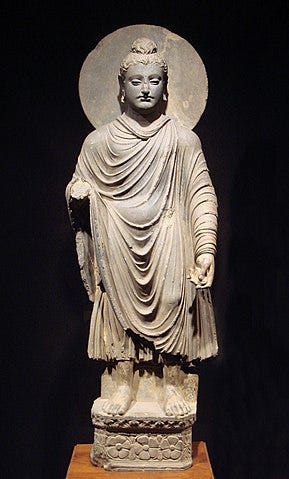

What a rich piece. Really enjoyed this, Jonas. That excerpt from Siddhartha is one of my favorites too. Love the way you draw from so many different ideas in this.
Weaving Siddhartha, the Greeks, Narnia, modern philosophy, etc. … just warms my heart. Truly exceptional work!
Yes. I remember the moments of haunting clarity as a child. From the ages of probably 8-11, I’d have these semi-regular episodes at night. Usually I’d be in my bed, hoping for the reprieve of sleep, but conscious that I had done nothing to deserve lying awake in bed, alive. I would wonder about the fountain of souls, and how we came to incarnate ourselves. Then I would think about the vast universe and the awesomeness of it, and how small we truly are. I’d consider death all the time, and as a kid, it felt like I’d travel there. Honestly, I’d cry silently in my room, and assume no one else should be trouble by me not being asleep, or the weight of my thoughts. It was awesome. I hated it, and I loved it.
I don’t know if that’s a relatively common experience for other people, but my 8 year old son (youngest of 3) seems to be grappling with the same awareness. I told him obsessing about eternity and death is a gift, and to lean into it… my poor kids.